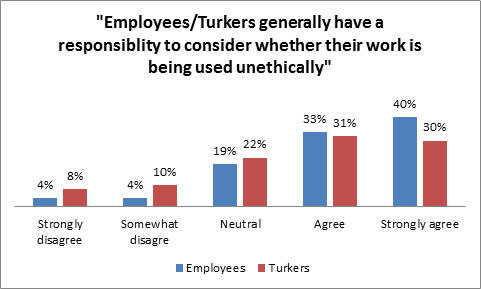The marching orders "think like an Industrialist" and Amazon's Mechanical Turk destroyed my integrity in just an afternoon. I'm still trying to figure out the cheapest way to get it back.
I've always been a progressive granola person, prone to raising an eyebrow at things like mTurk, but last week my boss said "I need you to put on your Industrialist hat" and so I did. Turns out I look like a big jerk in that hat; by the end of my first day using mTurk I was already devising ways to rip workers off to save a few cents. I caught myself and started being a more generous Requester, but my curiosity in mTurk was piqued.
For those who don't know, mTurk is an anonymous, unregulated internet marketplace where employers ('Requesters') post simple tasks they need done, paying remote workers ('Turkers') a few cents per task completed. Most Turkers make about $1.25 an hour, according to a 2010 study out of UC Irvine.
There are tons of articles on the ethics of using mTurk to get work done. Writers on The Huffington Post and beyond have blasted the platform as nothing more than a digital sweatshop and labor rights atrocity. Others argue that people Turking for income have only less-lucrative work options available to them, if any.
But what no one is asking is whether it's ethical to be a Turker. To sell your time and energy to a totally obscured cause. A 2010 study done by Panos Ipeirotis out of NYU posits that 40.92 percent of the tasks put up on the platform are for spam creation. It's important to ask not just whether it's ethical to publish this type of task on the site and pay people very little to execute, but also whether it's ethical to work for such a mal-intentioned Requester, contributing to spam creation and getting paid for it. Does it matter if you had no idea you were making spam? Is it your responsibility to find out before doing the work?
I surveyed 105 U.S.-based Turkers to get their thoughts on the ethical implications of what they do and how they do it. According to the UC Irvine study, 57 percent of all Turkers are U.S.-based. I disseminated the survey to Turkers by, what else, putting it up as a task on mTurk and paying respondents 15 cents to take it.
To gauge the way Turkers view their ethical responsibility, I asked respondents to indicate how much they agree with the sentiment: "In general, employees have the responsibility to consider whether their work is being used unethically by their employer." Overall, 73 percent respondents 'agreed' or 'strongly agreed' with this statement. They were more ambivalent about the statement "In general, Turkers have the responsibility to consider whether their work is being used unethically by Requesters" -- only 61 percent 'agreed' or 'strongly agreed.'
But even though 61 percent of respondents agreed that as Turkers they have a responsibility to know how their work is being used, only 34 percent of respondents had ever researched a Requester before, during or after working for them.
Fully 68 percent of total respondents encountered a task they felt was unethical (ie. upvoting something in a contest), but only 39 percent of those respondents had ever reported it to Amazon, with the rest choosing to keep working on the task anyway, or to move on without reporting it. Those who research Requesters to check what they're contributing to are, surprisingly, not more likely to report Requesters to Amazon if their tasks seem unethical than those who have never researched a Requester.
The ethical inconsistencies that abound here are well-encapsulated by the free form answer I got from one respondent, who said: "I remember once or twice I've done HITs where I had to vote for something. It's buying votes and that's wrong."
While people love to hate on Requesters for being so 'meh' about worker's rights, my data suggests that many Turkers are equally 'meh' about their ethical responsibilities as workers. I don't make this observation to apologize for Requesters who offer offensively low reimbursement or reject work arbitrarily; that's unfair. I raise this other side of the story because the consequences of forgetting that there are people exercising agency inside the machine are dire.
Some Requesters and some Turkers act in a way that's unfair, not just to the opposite party but to the world at large. I'd say conspiring to create tons of spam content is unfair to all of us.
Can we make Amazon Mechanical Turk more fair? It seems plausible, as there are already seeds of fairness sown throughout the platform; workers can't be excluded from participating for lack of a formal education, for example. This is hugely disruptive to the systems of elitism that mark traditional workplaces, and it gives people without any typical badges of achievement a fair shot at making some income.
There are several things Amazon might do to minimize the amount of unfairness perpetrated through their product. Long-time Turker Spamgirl has suggested that Requesters be required to fund their accounts with $100 from a bank account, and pass a phone screen before being permitted to post work to the marketplace. Perhaps Turkers who report rather than complete spammy tasks could be given small bonuses by Amazon, as a thank-you for decreasing their moderation burden.
Or Amazon could just change the name to Amazon Mechanical Jerk.
